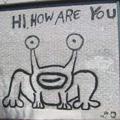Jim Brown reviewed The Details by Ia Genberg
"a quiet book...that holds a grace that vaults the sum total of quotidian moments into something more expansive"
This is a great catalog of the main character's relationships - each chapter is a portrait. From the translator's note, which perfectly describes the book:
"In some ways Detaljerna was an unexpected sensation. It's a quiet book, comprised of four chronicles of mostly ordinary people, a novel where 'nothing really happens.' That quiet, however, holds a grace that vaults the sum total of quotidian moments into something more expansive. (136)
This is a great catalog of the main character's relationships - each chapter is a portrait. From the translator's note, which perfectly describes the book:
"In some ways Detaljerna was an unexpected sensation. It's a quiet book, comprised of four chronicles of mostly ordinary people, a novel where 'nothing really happens.' That quiet, however, holds a grace that vaults the sum total of quotidian moments into something more expansive. (136)















